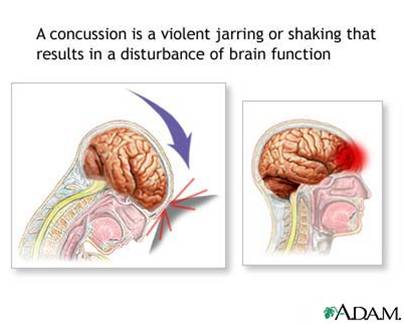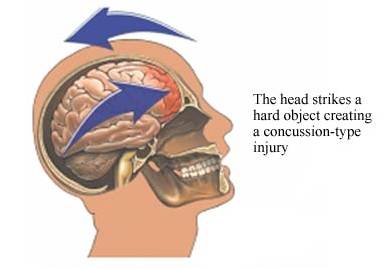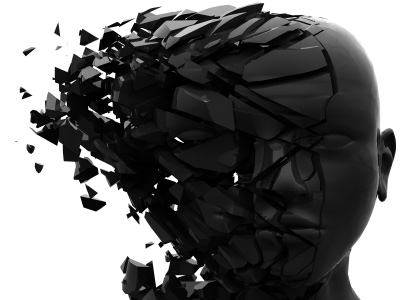Brain concussion is also known as the mild traumatic brain injury (MTBI). In this high velocity era, the emergency department often receives cases of traumatic brain injuries. They can be from motor-vehicle accident, a fall, sports accident, or due to assault. Although the skull is a very tough bone carrying the important role of protecting the fragile brain, high-velocity collision injuries can be severe enough to cause certain extent of damage to the brain, causing the patient to experience various symptoms.
 Definition
Definition
The definition of brain concussion states that it is a condition where loss of consciousness occurs as the result of a blow to the head or sudden movement of the brain within the head as from violent shaking of the head. A concussion may result when the head strikes against an object or is struck by an object. Concussions may produce unconsciousness or bleeding in or around the brain.
What causes brain concussion?
Anything that makes the brain bounce around and against the side of the skull can cause a concussion. For example:
- A blow or jolt to the head
- Severe jarring or shaking
- Abruptly coming to a stop
There are so many causes of brain concussion, to name a few in general, contact sports like boxing, rugby or American football and also motor-vehicle accidents. Thus, speed limit on the road is an important ruling to help prevent and reduce the rate of road accidents.
How are the symptoms of brain concussion like?
The progression of the signs and symptoms of brain concussion can be divided according by certain characteristic symptoms.
Memory/thinking ability

- Difficulty in thinking clearly
- Feeling slowed down in action
- Difficulty in concentrating
- Difficulty remembering new information
Physical signs and symptoms
- Headache
- Nausea
- Vomiting
- Hypersensitivity to light or noise
- Blurry vision
Emotional and mood changes
- Increased irritability
- Sadness or depression
- Nervousness
- Anxiety
Sleep disorder
- Sleeping more than usual

- Sleeping less than usual
- Trouble falling asleep
- Intermittent awakening
Emergency signs
When it concerns the brain, it is vital to be able to recognize signs and symptoms that can be indicative of serious brain damage or complications.
- Changes in alertness and consciousness
- Convulsions (seizures)
- Muscle weakness on one or both sides
- Persistent confusion or altered consciousness
- Persistent unconsciousness (coma)
- Repeated vomiting
- Unequal pupils
- Unusual eye movements
- Walking problems
The American Academy of Neurology created a grading parameter to grade the severity and progression of brain concussion termed the American Academy of Neurology Concussion March 1997 Severity Practice Parameter.
- Grade 1 – Transient Confusion
– No Loss of Consciousness
– Concussion Symptoms < 15 Minutes - Grade 2 – Transient Confusion
– No Loss of Consciousness
– Concussion Symptoms > 15 Minutes - Grade 3 – Any Loss of Consciousness, Brief or Prolonged
How is a diagnosis made?
Neurological examination
 Physicians will perform certain physical examination to assess the neurological state of the patient. The evaluation includes:
Physicians will perform certain physical examination to assess the neurological state of the patient. The evaluation includes:
- Balance
- Coordination
- Reflex
- Vision
- Muscle tone and strength
- Sensation
Computed Tomography Scan (CT scan)
As brain concussion is a form of traumatic brain injury, the development is usually from an acute event.  This is because CT scan also uses X-ray but a specialized one, runs faster than a typical MRI scan machine. Although CT scans better of the bones but it still is able to scan the soft tissues. Thus, hemorrhages or clots in the brain can still be detected by CT scan.
This is because CT scan also uses X-ray but a specialized one, runs faster than a typical MRI scan machine. Although CT scans better of the bones but it still is able to scan the soft tissues. Thus, hemorrhages or clots in the brain can still be detected by CT scan.
Magnetic Resonance Imaging (MRI)
Unlike CT scan, MRI uses magnetic waves as its name explains. Â This scan takes about 30 minutes to run. MRI would be a better option to detect  any abnormalities of the soft tissue accurately as compared to CT scan. The machine itself is a like a tunnel which claustrophobic patients might face problem during the test. But most importantly, if the patient has a metal implant, for example due to a previous fracture or pacemaker, patients like these are usually not eligible to undergo an MRI scan because the strong magnetic fields emitted by the MRI scanner can dislodge the metal device in the body.
any abnormalities of the soft tissue accurately as compared to CT scan. The machine itself is a like a tunnel which claustrophobic patients might face problem during the test. But most importantly, if the patient has a metal implant, for example due to a previous fracture or pacemaker, patients like these are usually not eligible to undergo an MRI scan because the strong magnetic fields emitted by the MRI scanner can dislodge the metal device in the body.
How will brain concussion be treated?
The goal of treatment is to allow the brain injury to heal.
- Rest—allow enough time for recovery
- Preventing re-injury—avoiding activities that might jolt or jar your head
- Preventing second impact syndrome—avoiding a second head injury in children and adolescents who have had a concussion
What is the prognosis of suffering from a brain concussion?
Full recovery is expected from an uncomplicated concussion. Dizziness, memory loss, problems thinking, irritability, headaches, sleep disturbances, and other symptoms may occur continue for weeks or even months afterwards.
What are the possible complications?
- Bleeding in the brain (intracerebral hemorrhage)
- Brain injury that results in physical, emotional, or intellectual changes or deficits
